Cambridgeshire Police and mental health staff join forces
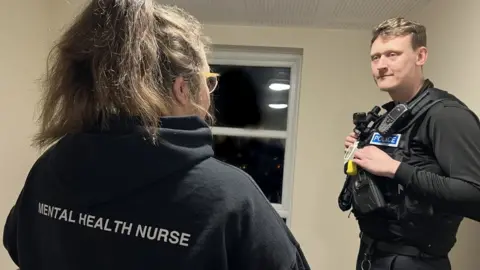 BBC
BBCPolice officers are spending hours dealing with incidents involving mental health, say forces. In one scheme in Cambridgeshire, psychiatric nurses are working with police on the ground to improve support for those in crisis. What is it like for those working on the mental health front line?

'Patients feel a lot safer'
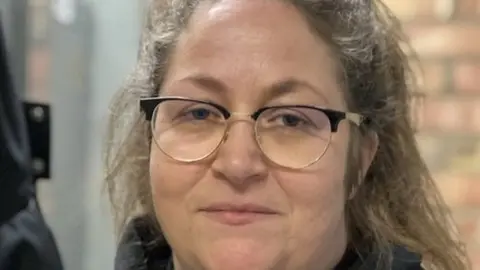
It is Friday night and psychiatric nurse Jamie Secker is out on patrol with police in Cambridgeshire.
The 40-year-old is part of a team from the Cambridgeshire and Peterborough NHS Foundation Trust (CPFT) who join officers in one of two specialist mental health response cars out seven nights a week. They can go to any call, but find those related to mental health are increasing.
"I still get a little bit nervous because I don't know what we are going to," she says. "Me and these officers are expected to come and make everything right and that feels like quite a lot of pressure."
The first call comes in about a young woman with a baby in St Neots. A man has called to say his partner is "going mad".
"It's not clear whether she has a mental health issue or is just angry," Ms Secker says. "We are going to support other officers who are there."
The team establishes that the woman now has a relative with her and the situation has calmed.
"When she first opened the door, she said she was scared of the police - so I was able to stick my head around the corner and very quickly reassure her.
"With my years of experience, I can judge whether it is a mental health case, whether it's someone at risk, or just someone understandably in distress, but don't need us to intervene.
"Patients feel a lot safer. I'm much less threatening. They haven't committed a crime. Police officers don't mean to be scary but they are covered in kit, I just come dressed in a hoodie."

'It brings home what they're going through'
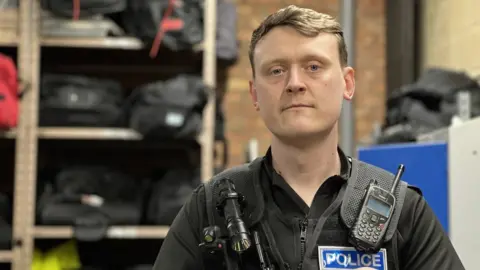
PC Peter Andrews has been a police officer for five years. He says more and more of the calls they go to have a mental health element to them.
"We do deal with more mental health jobs now, and they are taking up more of our time," the 30-year-old says.
Under Section 136 of the Mental Health Act, police officers can take people in crisis to a place of safety without a warrant. But without a medical practitioner as part of their team, accessing the right NHS services can take time.
Mr Andrews says sometimes they could be waiting hours at A and E waiting for mental health support.
"It puts a lot of strain on us and it means other members of the public who are calling 999 also don't get seen as well, and other immediate jobs don't get covered.
"A lot of jobs bring it home to you as to what people are going through."
Having Ms Secker as part of their team is making a big difference, he says.
"Jamie can put referrals straight in. For us it can take days or weeks - but she can get through straightaway and get people the help that they need."
Another call comes in.
"It's a man that has just been released from prison and has left his mum a note - he's standing by the tracks at Cambridge railway station. So we will go to help him."
The team proceed with caution. Before they arrive at the scene, officers from the British Transport Police have spoken to the man and have taken him home.

'It can be intense'
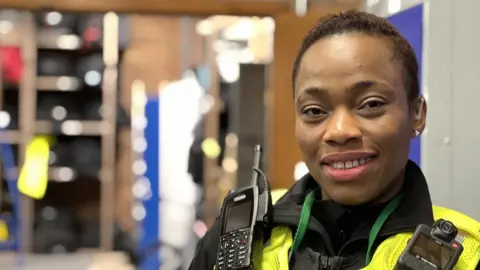
PC Babs Lawrence worked in nursing for the NHS before joining Cambridgeshire Police. Despite the pressure, the 38-year-old says they do cope with the stress.
"It can be intense. We are in the job to help people, but as a police officer we are not mental health professionals or crisis workers so having a psychiatric nurse here can be really helpful."
The first mental health response car began operating in the area last year as part of a pilot project.
During that nine-month trial, CPFT says the team dealt with about 50 incidents a month, and in 144 cases helped to avoid people being detained under the Mental Health Act.
The scheme, which is funded by the Cambridgeshire and Peterborough Integrated Care System (CPICS), has since been extended to a second response car.
Cambridgeshire Police say the scheme is freeing up vital policing resource.
"Working with this team is really helpful to diffuse the situation," Ms Lawrence says.
"Coming to these jobs knowing they are there to help and to give that reassurance is the perfect thing."
If you have been affected by the issues raised in this article, you can find information and support on the BBC Action line page
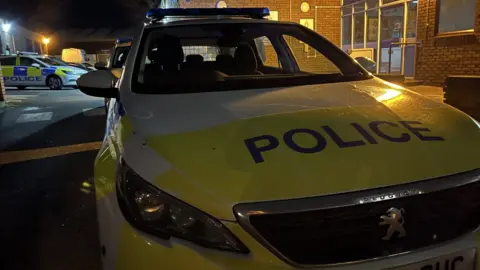

Find BBC News: East of England on Facebook, Instagram and Twitter. If you have a story suggestion email [email protected]
